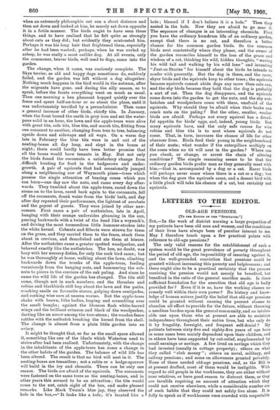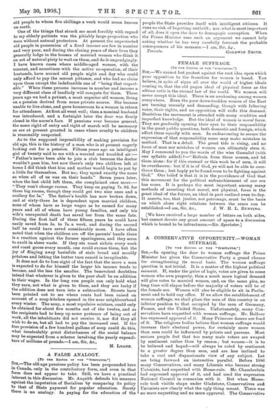LETTERS TO THE EDITOR.
OLD-AGE PENSIONS.
[TO TIM EDITOR OF THZ " SPZCTATOF.1
SIR,—In the work of district nursing a large proportion of my patients have been old men and women, and the conditions of their lives have always been of peculiar interest to Me. May I therefore touch upon a few practical points with reference to old-age pensions ?
The only valid reasons for the establishment of such a system would be the great prevalence of poverty throughout the period of old age, the impossibility of insuring against it, and the well-grounded conviction that pensions could be granted without increasing this poverty and helplessness ; and there ought also to be a practical certainty that the persons receiving the pension would not merely be benefited, but benefited in the ratio of the general sacrifice made. Is there sufficient foundation for the assertion that old age is badly provided for ? Even if it is so, have the working classes no remedy well within their own power? Do history and know- ledge of human nature justify the belief that old-age pensions could be granted without causing the poorest classes to abandon all effort to provide for the future, without throwing a needless burden upon the general community, and an intoler- able one upon those who at present are able to maintain independence throughout their entire lives, but who only do it by frugality, foresight, and frequent self-denial ? My patients between sixty-five and eighty-five years of age have in some cases been mainly dependent upon their children, and in others have been supported by out-relief, supplemented by small earnings or savings. A few lived on savings which they had invested (usually in cottage property) ; others on what they called "club money " ; others on naval, military, and railway pensions ; and some on allowances granted privately. None of these needed old-age pensions, and, as the Bill is at present drafted, most of them would be ineligible. With regard to old people in the workhouse, they are either without near relatives, or have good reason to distrust them, or they are invalids requiring an amount of attention which they could not receive elsewhere, while a considerable number are of such habits that they could not safely live 'alone. It is folly to speak as if workhouses were crowded with respectable
old people to whom five shillings a week would mean heaven on earth.
One of the things that struck me most forcibly with regard to my elderly patients was the pitiably large proportion who were without natural protectors. At present the unprotected old people in possession of a fixed income are few in number and very poor, and during the closing years of their lives they generally lodge in the houses of married women who think it an act of natural piety to wait on them, and do it ungrudgingly. I have known cases where middle-aged women, with the consent, and sometimes with the active co-operation, of their husbands, have nursed old people night and day who could only afford to pay the merest pittance, and who had no claim upon them except the indefeasible one of "being that respect- able." When these persons increase in number and income a very different class of landlady will compete for them. Three years ago we had a patient, a most superior old woman, living on a pension derived from some private source. She became unable to live alone, and gave houseroom to a woman in return for attendance. At first all went well; then a nominal husband was introduced, and a fortnight later the door was firmly closed in the nurse's face. If pensions ever become general, the same right of entry and right of search will be necessary as are at present granted in cases where cruelty to children is reasonably suspected.
As to the supposed impossibility of making provision for old age, this is the history of a man who is at present eagerly looking out for a pension. Fifteen years ago an intelligent girl of twenty said to me with a worried and troubled air :— " Father's never been able to join a club because the doctor wouldn't pass him, but now there's only two children left at home I did think that him and mother would begin to put by a little for themselves. But no; they spend exactly the same as when all of us was on their hands." Seven years later, when the last child left them, she complained once more:— " They won't change rooms. They keep on paying 7s. 9d. for three big rooms, though they could get two nice ones and a scullery for 5s." The father's health has now broken down, and at sixty-three he is dependent upon married children, none of whom have as large wages as he earned for many years and all of whom have young families, and only his wife's unexpected death has saved her from the same fate. During the first half of these fifteen years he could have easily saved from 5s. to 7s. a week, and during the second half he could have saved considerably more. I have often noted that when the children are off the parents' hands there is a reaction against the former sparingness, and they seem to exult in sheer waste. If they ate roast sirloin every week and roast goose every month, one could excuse them, but the joy of flinging away basinfuls of stale bread and mouldy potatoes and letting the butter turn rancid is inexplicable.
It does not do to lose sight of the fact that the more a man is expected to do for himself the larger his income tends to become, and the less the smaller. The benevolent doubtless intend that whatever is given to the poor shall be an addition to their wages. In the. long run people can only hold what they earn, not what is given to them, and they are lucky if the addition does not turn into a subtraction. Streets have been pointed out to me where rents had been raised on account of a soup-kitchen opened in the near neighbourhood every winter. The soup, a most repulsive mixture, could only be obtained for about five months out of the twelve, and as the recipients had to keep up some pretence of being out of work, all the inhabitants did not receive it, nor did they all wish to do so, but all had to pay the increased rent. If the free provision of a few hundred gallons of soup could do this, what incalculably great disturbances of the social balance may be expected from a scheme involving the yearly expendi- ture of millions of pounds.—I am, Sir, &c., M. LOANN.







































 Previous page
Previous page